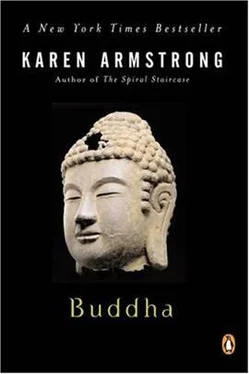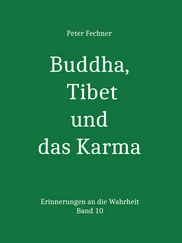yet the Buddha’s first attempt to teach was a complete failure. On his way to Gaya, he passed an acquaintance, Upaka, a Jain, who immediately noticed a change in his friend. “How peaceful you look! How alert!” he exclaimed. “You are so serene! Your complexion is clear, your eyes are bright! Who is your Teacher? and whose dhamma are you following these days?” It was a perfect opening. The Buddha explained that he had no teacher and belonged to no sangha. As yet, there was nobody like him in the world, because he had become an Arahant, an “accomplished one” who had won through to the supreme enlightenment. “What!” Upaka cried incredulously. “Surely you are not saying that you are a Buddha, a Jina, a Spiritual Victor, the Holy One for whom we are all waiting?” Yes, the Buddha replied. He had conquered all craving and could indeed be called a Jina. Upaka looked at him skeptically and shook his head: “Dream on, friend,” he said. “I’m going this way.” Abruptly, he turned off the main road into a side track, refusing the direct route to Nibbana.
Undeterred, the Buddha continued his journey to Varanasi, an important city and a center of learning for the brahmins . The Buddha did not linger in the town, however, but went straight to the Deer Park in the suburb of Isipatana, where he knew that his five former companions were living. When these bhikkhus saw him approaching they were alarmed. As far as they knew, Gotama, their old mentor, had abandoned the holy life and reverted to luxury and self-indulgence. They could no longer greet him as before, with the respect due to a great ascetic. But they were good men, dedicated to ahimsa, and did not want to hurt his feelings. Gotama, they decided, could sit with them for a while, if he wished, and rest after his long walk. But when the Buddha came closer, they were completely disarmed. Perhaps they too were struck by his new serenity and confidence, because one of the bhikkhus ran forward to greet him, taking his robe and his bowl, while the others prepared a seat, bringing water, a footstool and towel, so that their old leader could wash his feet. They greeted him with affection, calling him “friend.” This would often happen. The compassion and kindliness of the Buddha’s manner would frequently defuse hostility in humans, gods and animals alike.
The Buddha came straight to the point. They should not really call him friend any more, he explained, because his old self had vanished and he had a wholly different status. He was now a Tathagata, a curious title whose literal meaning is “Thus Gone.” His egotism had been extinguished. They must not imagine that he had abandoned the holy life. Quite the reverse was true. There was a compelling conviction and urgency in his speech that his companions had never heard before. “Listen!” he said, “I have realized the undying state of Nibbana. I will instruct you! I will teach you the Dhamma!” If they listened to his teachings and put them into practice, they could become Arahants too; they could follow in his footsteps, entering into the supreme truth and making it a reality in their own lives. All they had to do was to give him a fair hearing.
The Buddha then preached his first sermon. It has been preserved in the texts as the Dhammacakkappavattana-Sutta, The Discourse that Set Rolling the Wheel of the Dhamrna, because it brought the Teaching into the world and set in motion a new era for humanity, who now knew the correct way to live. Its purpose was not to impart abstruse metaphysical information, but to lead the five bhikkhus to enlightenment. They could become Arahants, like himself, but they would never equal their teacher, because the Buddha had achieved Nibbana by himself, alone and unaided. He had then won further distinction, by making the decision to preach to the human race, becoming a Samma SamBuddha, a Teacher of the Supreme Enlightenment. Later Buddhist teaching would maintain that a Samma Sambuddha will only appear on earth every 32,000 years, when the knowledge of the Dhamma had completely faded from the earth. Gotama had become the Buddha of our age, and began his career in the Deer Park of Isipatana.
But what was he going to teach? The Buddha had no time for doctrines or creeds; he had no theology to impart, no theory about the root cause of dukkha, no tales of an Original Sin, and no definition of the Ultimate Reality. He saw no point in such speculations. Buddhism is disconcerting to those who equate faith with belief in certain inspired religious opinions. A person’s theology was a matter of total indifference to the Buddha. To accept a doctrine on somebody else’s authority was, in his eyes, an “unskillful” state, which could not lead to enlightenment, because it was an abdication of personal responsibility. He saw no virtue in submitting to an official creed. “Faith” meant trust that Nibbana existed and a determination to prove it to oneself. The Buddha always insisted that his disciples test everything he taught them against their own experience and take nothing on hearsay. A religious idea could all too easily become a mental idol, one more thing to cling to, when the purpose of the dhamma was to help people to let go.
“Letting go” is one of the keynotes of the Buddha’s teaching. The enlightened person did not grab or hold on to even the most authoritative instructions. Everything was transient and nothing lasted. Until his disciples recognized this in every fiber of their being, they would never reach Nibbana. Even his own teachings must be jettisoned, once they had done their job. He once compared them to a raft, telling the story of a traveler who had come to a great expanse of water and desperately needed to get across. There was no bridge, no ferry, so he built a raft and rowed himself across the river. But then, the Buddha would ask his audience, what should the traveler do with the raft? Should he decide that because it had been so helpful to him, he should load it onto his back and lug it around with him wherever he went? Or should he simply moor it and continue his journey? The answer was obvious. “In just the same way, bhikkhus, my teachings are like a raft, to be used to cross the river and not to be held on to,” the Buddha concluded. “If you understand their raft-like nature correctly, you will even give up good teachings ( dhamma ), not to mention bad ones!” His Dhamma was wholly pragmatic. Its task was not to issue infallible definitions or to satisfy a disciple’s intellectual curiosity about metaphysical questions. Its sole purpose was to enable people to get across the river of pain to the “further shore.” His job was to relieve suffering and help his disciples attain the peace of Nibbana. Anything that did not serve that end was of no importance whatsoever.
Hence there were no abstruse theories about the creation of the universe or the existence of a Supreme Being. These matters might be interesting but they would not give a disciple enlightenment or release from dukkha. One day, while living in a grove of simsapa trees in Kosambi, the Buddha plucked a few leaves and pointed out to his disciples that there were many more still growing in the wood. So too he had only given them a few teachings and withheld many others. Why? “Because, my disciples, they will not help you, they are not useful in the quest for holiness, they do not lead to peace and to the direct knowledge of Nibbana.” He told one monk, who kept pestering him about philosophy, that he was like a wounded man who refused to have treatment until he learned the name of the person who had shot him and what village he came from: he would die before he got this useless information. In just the same way, those who refused to live according to the Buddhist method until they knew about the creation of the world or the nature of the Absolute would die in misery before they got an answer to these unknowable questions. What difference did it make if the world was eternal or created in time? Grief, suffering and misery would still exist. The Buddha was concerned simply with the cessation of pain. “I am preaching a cure for these unhappy conditions here and now,” the Buddha told the philosophically inclined bhikkhu, “so always remember what I have not explained to you and the reason why I have refused to explain it.”
Читать дальше












